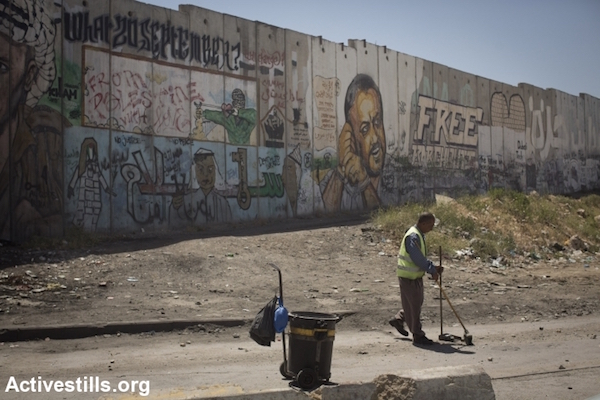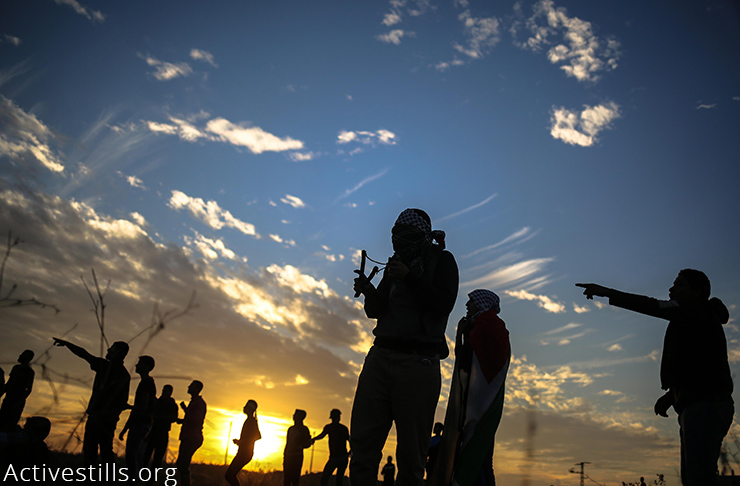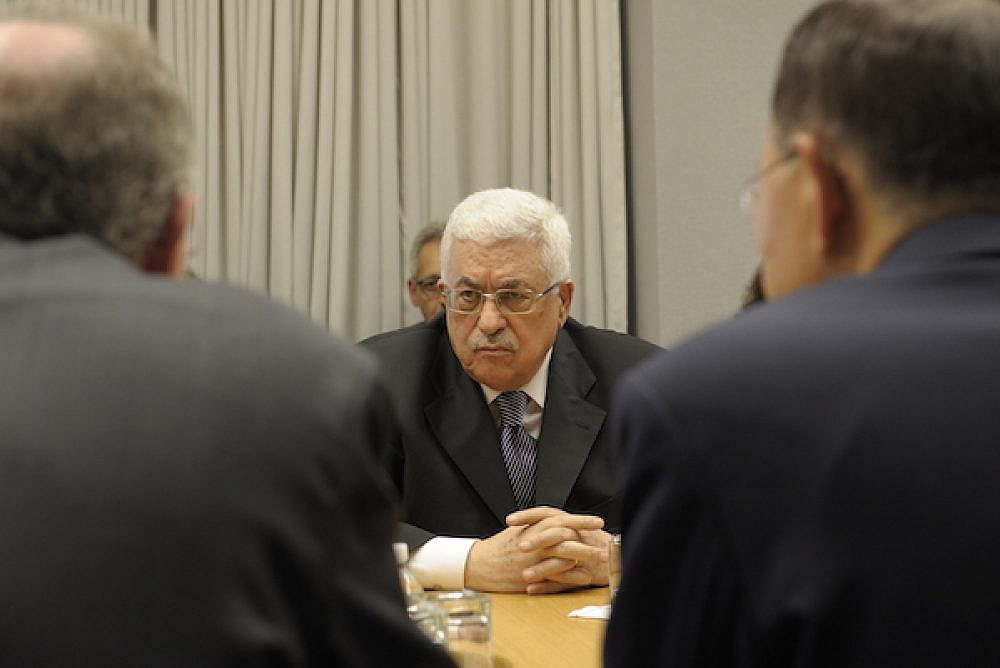When Yassser Arafat’s health was slowly fading and the Israeli army put him under siege, there was no war of succession taking place around him. This is not because his rule was petrifying. On the contrary, there were always disagreements, and often his colleagues prevented him from implementing his own decisions.
When Arafat led Fatah, there was never a war over who would succeed him. The consensus around Arafat’s rule pushed Abu Nidal and Abu Musa, who sought to undermine him, out of Fatah and the Palestine Liberation Organization (PLO). Kicked out of the national movement, the two disappeared until the first was adopted by Iraq and the second by Syria. At home they simply had no public or institutional support.
Palestinian President Mahmoud Abbas is not under siege. He comes and goes from the Muqata’a without any hindrance from the Israeli authorities. He is, however, under political siege. While he insists on holding on to power, the rug is being pulled out from under his feet. According to polls published last year by Dr. Khalil Shikaki, two-thirds of the Palestinian public want Abbas step down. The war within Fatah over his succession began over the past two years and has been rapidly gaining traction ever since.
As Abbas’ political descent has accelerated, he has begun relying on his security forces. He uses them not only to suppress Hamas opposition through security coordination with Israel, but also against mass demonstrations by Palestinian civil society, as we witnessed several months ago when Palestinian teachers went on strike, or the protests against a new national insurance law.
In a political system where the lines between political and party involvement and public civil service are blurred, and where job security is predicated on membership in Fatah, the security and intelligence forces are the political player which Abbas uses to bolster his power. The head of the Palestinian Security Services, Majd Farj, enjoys Abbas’ trust; one can only assume that Farj and the PSS do not want to lose their political power on the day after Abbas, despite their lack of popular support.
They promise Fatah and intelligence officials that they will ensure stability and their position in the establishment. Farj can only hope that his appreciation by Israeli and U.S. intelligence officials — due to a joint effort against Hamas — will cause them to support him as Abbas’ successor. They may, however, find that they must compete with those who find themselves outside the tiny, ruling elite — representatives of the people who do not take kindly to the Palestinian Authority’s coordination with Israel, and the never-ending occupation that impedes Palestinian democracy.
Dahlan’s regional plan
Another player who is hoping to leverage both external and internal support is Mohammed Dahlan. Abbas kicked him out of Fatah in 2011, and since then he has sought political refuge in the UAE. A recent article published in Middle East Eye reveals Dahlan’s current strategy. He and his patrons in the Emirates want to do away with Abbas, and are trying to gain the support of Egypt and Jordan. It is not out of the realm of possibility that inner-Palestinian politics were discussed at length during Abbas’ meeting with Egyptian President el-Sissi in late May. Abbas was there on official business, to speak before a conference of Arab foreign ministers in the lead-up to the Paris Peace Summit. It is likely that Dahlan’s attempt to bring Egypt into the fold in order to unseat the Palestinian president is worrying for Abbas.
Dahlan enjoys strong ties with Egyptian military brass, and in 2014 harshly attacked Abbas on Egyptian television. But Egypt has other worries apart from the future of Palestinian succession. It is looking for a way to stop the support of Hamas’ military wing for Islamic State affiliates in Sinai, and to cut Hamas off from the Muslim Brotherhood. Dahlan, who in 2007 fought against Hamas and lost, promised Egypt to take care of the Islamist group with great efficiency when he defeats Abbas. By bringing the Emirates, Egypt, and Jordan to his side, Dahlan hopes to force Abbas to resign, before uniting Fatah and going to elections against Hamas. Dahlan believes that Hamas is weak and suffers from internal splits, and thinks he can ensure that will only continue in the future.
Dahlan also has strong ties to officials in the Israeli security establishment, both past and present. As the former head of the Palestinian Preventive Security forces in Gaza, he worked with the Shin Bet and the Israeli army against Hamas, collaborated with Israeli officials on lucrative economic initiatives, and negotiated with Israel on temporary arrangements as well as a final-status agreement. He shares newly-appointed Defense Minister Avigdor Liberman’s desire to see Abbas go. Dahlan promises Israel that after he is elected he will both continue suppressing Hamas and reach a peace agreement.
Egypt, for its part, is suspicious of Dahlan and is looking at other ways of reaching his strategic goals. Recently Sissi called for reconciliation between Fatah and Hamas, with Egypt restarting its dialogue with the latter. According to reports Jordan is not enthusiastic over the prospects of rule by Dahlan, preferring to wait and see if he can deliver. The Hashemite Kingdom is not interested in getting its hands dirty in the succession war, while at the same time hoping that it will be able to safeguard its interests at the Dome of the Rock and fight radical Islam alongside Israel, should Dahlan become the new Palestinian leader. Meanwhile Jordan is looking closely at Dahlan’s status in the occupied territories and whether his ties to Israel and the money he pours into the Gaza Strip — in order to buy support — make him a superior candidate.
The Jordanians have a reason to worry. Dahlan is known for being belligerent, corrupt, and hedonistic; he does not hesitate to do everything in his power to promote his status. According to reports Dahlan is supported by Arafat’s nephew and former foreign minister Nasser al-Qudwa, former Palestinian prime minister Salam Fayyad (who was dismissed by Abbas), and former secretary-general of the PLO Executive Committee Yasser Abed Rabbo (also dismissed by Abbas). Neither Fayyad nor Abed Rabbo were members of Fatah, and their popular support was marginal. Al-Qudwa is in Fatah, but is not a member of the security establishment and does not enjoy popular support.
Barghouti’s march on Jerusalem

Dahlan and Farj’s weak spots are precisely where jailed popular Palestinian leader Marwan Barghouti has an advantage. He enjoys widespread support among both Fatah members and the Palestinian public, and his status as a prisoner only adds to his image. As opposed to his opponents, who mostly market their personalities and ties with foreign groups, Barghouti turns inward to the Palestinian public, and offers a fundamentally different strategy.
As the Palestinian public reels from a feeling of crisis, despair, and dead end, as well as a deep suspicion vis-à-vis the interests driving those fighting over Abbas’ succession, Barghouti has the ability to win support, as he is paving a new path and believes in the populace’s power to take control. A document published by one of the heads of the Barghouti camp, which I recently obtained, reveals more than what I have published on these issues in the past.
Barghouti’s goal is no different from that of Abbas or even the Arab Peace Initiative: a Palestinian state based on 1967 borders and implementing UN Resolution 194 regarding Palestinian refugees and their right of return. The difference is in the way Barghouti proposes to achieve these goals.
As opposed to Abbas and his competitors, Barghouti’s supporters believe that the key to liberation is not on the international stage but in the Palestinian arena. Abbas’ insistence on using exclusively international channels is, to their mind, the problem and not the solution. It allows Israel to continue with its colonial project. The alternative is recruiting the masses to a determined, lasting, popular nonviolent struggle. The change must first come from below, only later can it be translated into political maneuvering. The struggle will end only after independence is achieved. There is no agreeing to stop the struggle as a condition to hold negotiations with Israel, according to the document.
As opposed to Abbas’s other opponents, as well as Abbas himself, Barghouti is close to high-ranking Hamas members, and in the past met with Hamas members in prison to discuss national reconciliation efforts. It is likely that his plans are accepted by Hamas officials both inside and outside prison. The first step Barghouti proposes is national reconciliation and holding elections within PLO and PA institutions, which will include Hamas.
According to the document, a pan-Palestinian — both in Palestine and the diaspora — action plan must be put in place. It must be thorough and detailed — down to daily and weekly action items — that are to be coordinated with all the wings and factions that implement it, and managed efficiently with the PLO’s oversight. A driven, determined leadership is necessary, as are proper planning and central oversight, in order to manage a popular, nonviolent struggle and succeed. Meanwhile Palestinians must build a united community that is ready for sacrifice. The Barghouti camp is well aware that it is easy to turn the Palestinian public toward violence, and says that there will be zero tolerance for those who stray from the nonviolent struggle and violate the leadership’s directives.
As per Barghouti’s plan the Palestinian Authority will not be dismantled but rather turned into a body that aids the Palestinian public in withstanding the daily burden as a result of their uprising through a mutual support system to be developed by the PA. The PLO will take the place of the PA as the central body leading the Palestinian struggle. Media outlets will be instructed to provide believable, non-exaggerated reports, since trust is a central condition for the success of the struggle.
The struggle will open with a declaration of the end of the Oslo Accords, an end to security coordination, rescinding the PLO’s recognition of Israel, and a declaration of its willingness to enter into negotiations based on new principles in line with the international consensus, with a short timetable for the end of negotiations. On the first day of the struggle, says the document, Palestinians will burn their IDF-issued identification cards, thus symbolically cutting off ties with Israel. The nonviolent struggle will focus on disrupting the daily lives of Israeli settlers and soldiers in the West Bank by cutting off roads, water and electricity lines, and besieging settlements and Israeli neighborhoods in East Jerusalem.
The crown jewel of the struggle will be a mass march to Jerusalem, which will be led by the new head of the PLO. He will declare that the goal of the march is to realize the right to pray at Al Aqsa Mosque, and not leave the site until independence is achieved. The marchers will join masses of Palestinian citizens of Israel and citizens of foreign countries who will come to Israel in order to participate in the protest. Those who won’t be allowed in will organize actions outside Israeli embassies across the world. Meanwhile Palestinian refugees will march toward Israel’s borders, demanding their right of return, while refugee flotillas will make their way through the sea.
The rise of a new generation

It is not difficult to identify the obstacles in Barghouti’s plan. On the one hand it is far-reaching; on the other hand, it sows the seeds of its own failure by announcing that its success depends on being wide-ranging, particular, properly managed, and enforced compliance. It does not take into account the non-efficient patterns of both the PLO and Fatah, the lack of compliance to the leadership as well as general efficiency. The plan also ignores Israel’s capabilities to drive a stake through the uprising, and does not offer ways to deal with this issue.
It is a mistake, however, to believe that the Barghouti camp will ditch the plan entirely. It is more probable that they will make changes and adjustments. Some of the conditions that currently seem absolutely necessary may end up becoming “preferable.” In certain conditions Barghouti’s supporters may prefer to implement the plan in one area, and only partially, in the hopes that a popular uprising could erupt as the result of one cell, and spread like wildfire.
The founders of Fatah stood before a dilemma in 1964. They founded the group in 1959 and believed that they needed to broaden their ranks and gain support in their revolutionary ideology before they launch an armed struggle against Israel. The establishment of the PLO under the cover of Egypt threatened to destroy the small organization’s chances of winning the hearts and minds of the masses. Facing the dilemma between expanding the group and immediately launching an armed struggle in order to compete with the PLO, the majority sided with the latter. Barghouti’s suggestions are in a sense a rehashing of Fatah’s and the PLO’s teenage years, and just as the establishment of an organizational infrastructure was abandoned, the same thing can happen this time around as well.
The struggle over Abbas’ succession signals a generational change among the Palestinian leadership. The old guard, those who established Fatah and the PLO, the refugees of 1948 whose families were dispersed across the Arab world and spent many years in the diaspora, will be replaced by young people who have spent the majority of their lives in Palestine, where the majority of their families live. They acquired the majority of their experience and public status in the intifadas or in Israeli prison. This is precisely how the new generation is different from the old guard, whose status was built on the legacy of armed struggle. Abbas’ generation used this status to convince the public of the necessity of going the political route. The failure of this approach has only hastened the rise of the generation of the “children of the land.”
This article was first published in Hebrew on Local Call. Read it here.

